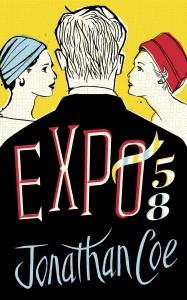 Published by Viking 5 September 2013
Published by Viking 5 September 2013
288pp, hardback, £16.99,
Reviewed by Caroline Sanderson
Despite a grand British tradition that encompasses Kingsley Amis, P.G. Wodehouse, David Lodge, Muriel Spark, Michael Frayn, Beryl Bainbridge and (my favourite) E.F. Benson, it’s such a shame that one rarely come across a really good comic novel these days. I’m not asking for belly laughs, but I do love a droll plot, some well-aimed, but amiable lampoonery and a lightness of touch in the telling.
So three cheers for Jonathan Coe and Expo 58. Coe is probably best known for The Rotters’ Club and What a Carve Up!, his satires of life in 1970s Britain and the Thatcher years respectively. He describes Expo 58 however as ‘not really a satire but a comedy. I love the classic light comedy films of the 1930s and 40s and wanted to do something delicate like that…rather than hammering things home.’
Set against the backdrop of the 1958 World Fair – the ‘Exposition Universelle et Internationale de Bruxelles’ – Expo 58 draws its comedy from the ‘last days of British embarrassedness and uptightness’. Thomas Foley, a handsome (think Dirk Bogarde or Gary Cooper), but unassuming 32-year old civil servant at the Central Office of Information is catapulted from Tooting and ‘the smug quietude of that deathly suburb’ into a six-month stay in Brussels. His mission: to oversee the British exhibits at the Fair, centred upon a replica pub called The Britannia, which has a barmaid called Shirley Knott. Close by, in a ‘Belgian joke’, the Russian and American pavilions at the Fair are placed almost adjacent to one another, and as a result of this Cold War in microcosm, Thomas gets entangled in a rum case of espionage, not to mention the couple of romantic intrigues which leave him on a rather sticky wicket where his humdrum marriage to Sylvia back in Blighty is concerned. It’s not so much Ian Fleming, as Ian Flemish.
This engaging novel has a rather ambling set-up which nevertheless feels consistent with the less hurtling decade to which Coe expertly transports us. He beautifully nails both the bygone trappings and the now quaint-sounding idiom of the era. Characters variously smoke while pregnant, wear trench coats and trilby hats, and have – and sometimes do not have – ‘gumption’. There are chapters entitled ‘A nice old pickle’ and ‘A rum sort of cove’. Thomas’s infant daughter Gill gets ‘dandled’ on his knee but ‘Baby’ also needs constant top-ups of gripe water. His Tooting neighbour – Norman Sparks, a martyr to his corns – is ‘a crashing bore of the first water’. In Brussels, and confronted at the Fair with ‘real blacks’ from the Belgian Congo and Ruanda-Urundi, Thomas prides himself on being ‘free of skin prejudice’. And I loved the polite testiness of the letters from his wife back home. ‘I really don’t know what I can tell you of the last few weeks that will not bore you to tears by comparison with your own account of a visit from the Chancellor of the Exchequer.’
Reading Expo 58 is like watching one of those public information films crossed with an Ealing comedy. There are some dicey moments when events threaten to unspool from the reel (will Tony return to his ‘dearest Syllabub’, or disappear into the continental sunset with a foreign female?) but never are we really in any doubt that, as the closing credits go up, stiff upper lips and the Best of British will have prevailed. Bravo.
